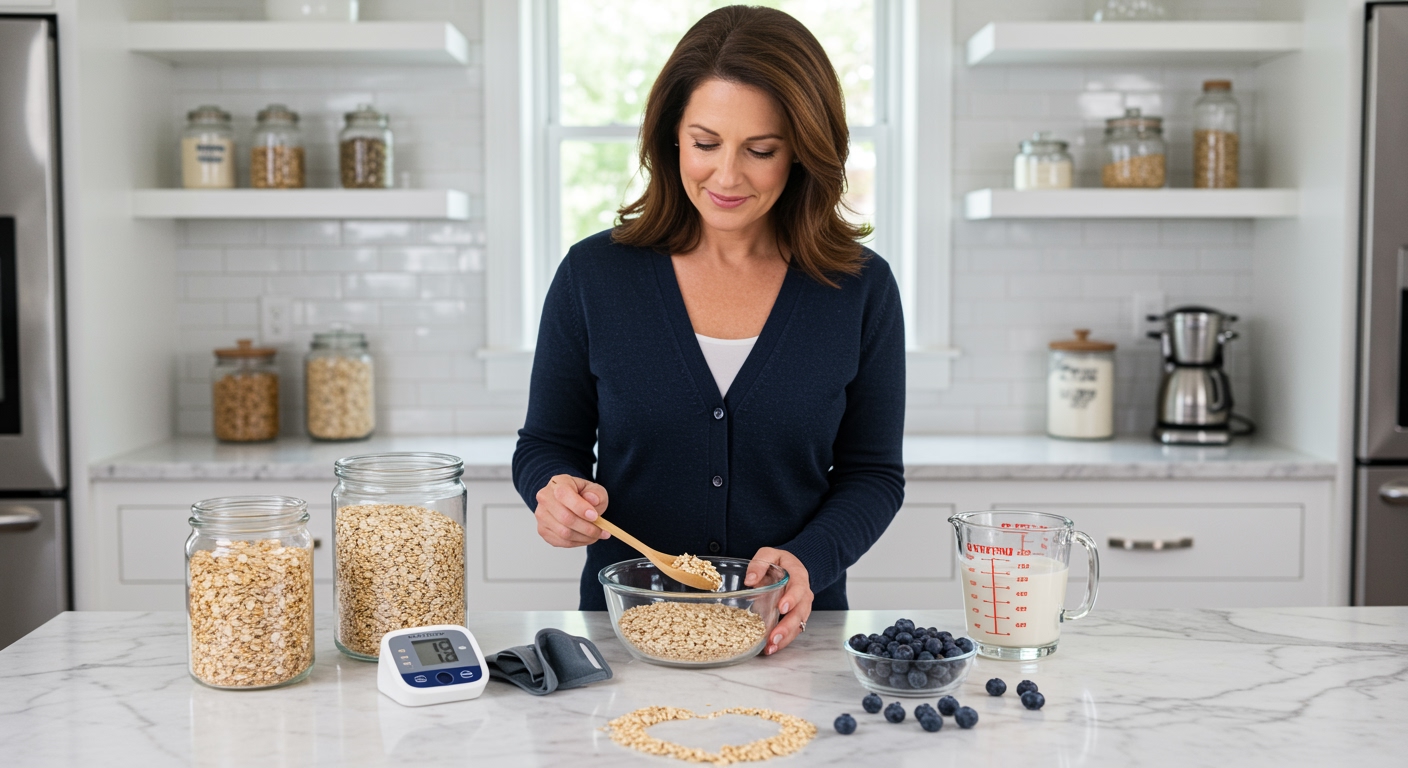✪ Key Takeaway: Oats contain beta-glucan fiber that can reduce blood pressure by 2-3 mmHg when consumed regularly as part of a balanced diet.
Introduction
Your morning bowl of oats might be doing more than filling your stomach.
You probably chose oats because someone told you they are heart-healthy, but you might wonder if they actually help with your blood pressure numbers.
Hi, I am Abdur, your nutrition coach and today I am going to explain exactly how oats affect your blood pressure and whether they deserve a place in your daily routine.
What Makes Oats Special for Blood Pressure?
Oats contain a unique type of soluble fiber called beta-glucan that sets them apart from other grains.
This fiber forms a gel-like substance in your digestive system that helps reduce cholesterol absorption and supports healthy blood vessel function.
Research shows that consuming 3 grams of beta-glucan daily can lower systolic blood pressure by 2-3 mmHg and diastolic pressure by 1-2 mmHg.
These numbers might seem small, but they represent a meaningful reduction in cardiovascular risk over time.
The mechanism works through multiple pathways in your body that support overall heart health.
✪ Fact: One cup of cooked oats provides about 4 grams of beta-glucan fiber, exceeding the daily recommended amount.
How Do Oats Lower Blood Pressure?
The beta-glucan in oats works by binding to cholesterol in your intestines and preventing its absorption into your bloodstream.
Lower cholesterol levels mean less plaque buildup in your arteries, which allows blood to flow more easily and reduces pressure on vessel walls.
Oats also contain avenanthramides, which are antioxidant compounds that help relax blood vessels and improve circulation.
These compounds work by increasing nitric oxide production in your blood vessels, which causes them to dilate and reduce resistance to blood flow.
The potassium content in oats provides additional support by helping your kidneys eliminate excess sodium from your body.
This sodium-potassium balance is crucial for maintaining healthy blood pressure levels throughout the day.
✪ Pro Tip: Combine oats with potassium-rich fruits like bananas for enhanced blood pressure benefits.
Which Type of Oats Work Best?
Steel-cut oats and old-fashioned rolled oats contain the highest levels of beta-glucan compared to instant varieties.
The more processing oats undergo, the more their fiber structure breaks down and loses effectiveness for blood pressure management.
Instant oats still provide benefits, but you need larger portions to achieve the same beta-glucan intake as less processed versions.
Oat bran contains the highest concentration of beta-glucan, making it an excellent choice if you want maximum blood pressure benefits in smaller servings.
You can add oat bran to smoothies, yogurt, or baked goods to increase your daily fiber intake without changing your meal routine.
✪ Note: Avoid flavored instant oats that contain added sugars, which can counteract blood pressure benefits.
How Much Should You Eat Daily?
Most studies showing blood pressure benefits used 3-4 grams of beta-glucan daily, which equals about one cup of cooked oats.
You can split this amount throughout the day by having half a cup at breakfast and adding oat bran to other meals or snacks.
Consistency matters more than timing, so choose a schedule that fits your lifestyle and stick with it for long-term benefits.
Some people experience digestive discomfort when suddenly increasing fiber intake, so start with smaller portions and gradually increase over 1-2 weeks.
Remember to drink plenty of water when eating high-fiber foods like oats to prevent constipation and support proper digestion.
The blood pressure benefits typically become noticeable after 4-6 weeks of consistent consumption, so patience is important.
✪ Pro Tip: Track your blood pressure weekly to monitor improvements after adding oats to your routine.
Are There Any Limitations?
Oats work best as part of an overall heart-healthy diet rather than as a standalone solution for high blood pressure.
If you have severe hypertension, oats alone will not replace the need for medical treatment and lifestyle changes recommended by your doctor.
People with celiac disease must choose certified gluten-free oats to avoid cross-contamination with wheat, barley, or rye during processing.
Some individuals may experience blood sugar spikes from oats, especially if they add sweeteners or eat large portions at once.
The fiber in oats can interfere with certain medications if taken too close together, so space your oat consumption and medication timing appropriately.
Always discuss dietary changes with your healthcare provider if you take blood pressure medications to ensure safe and effective management.
✪ Note: Monitor your response to oats and adjust portions based on your individual tolerance and health goals.
The Bottom Line
Oats can be a valuable addition to your blood pressure management strategy when consumed regularly as part of a balanced diet.
Small consistent changes in your daily food choices create the foundation for lasting health improvements, and oats represent one of the simplest ways to support your cardiovascular system naturally.
I would love to hear about your experience with oats and blood pressure management, so please share your questions or results in the comments below.
References
At NutritionCrown, we use quality and credible sources to ensure our content is accurate and trustworthy. Below are the sources referenced in creating this article:
- PubMed: Effects of oat beta-glucan on blood pressure
- PMC: Oat consumption and cardiovascular health
- Wiley Online Library: Beta-glucan and hypertension mechanisms





